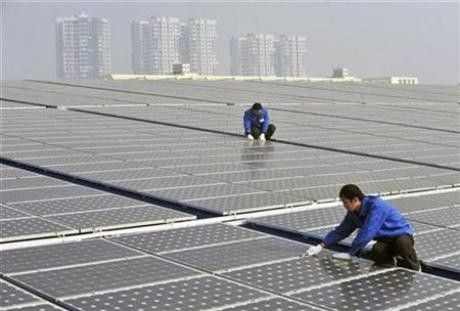Chinese Solar Companies, Unfazed By 2012 Tariffs, Could Take a Hit From Latest Penalties

The first time U.S. trade officials slapped import tariffs on China-made solar panels, in 2012, Chinese manufacturers barely flinched: Last year, shipments of the panels to the U.S. increased, and Chinese companies expanded their U.S. market share and kept prices low. However, the U.S. announced a new round of the tariffs this week, and this time, analysts say, they might actually work.
On Tuesday, the U.S. Commerce Department imposed duties of up to 35 percent on Chinese solar panels after ruling that Chinese government subsidies were used to keep the prices of panels and related components artificially low. A similar ruling on additional anti-dumping tariffs is expected in July.
The 2012 ruling imposed tariffs of up to 36 percent on imported panels made from Chinese solar cells. But many Chinese companies skirted the tariffs by procuring cells from Taiwan and assembling the completed modules in China. That prompted a new drive to close the Taiwan loophole by targeting not only Chinese solar cells or wafers, but final panel production done in China as well.
Solar analysts said that, if finalized, the new tariffs could substantially increase prices of solar panels from Chinese suppliers and reduce demand from U.S. project developers and installers, though it’s too early to predict by how much, they said.
If successful, that would reverse or reduce the growth of Chinese solar panel shipments and low-cost supplies.
Chinese suppliers shipped 64 percent more solar panels to the United States last year than they did in 2012, according to Shyam Mehta, a lead solar analyst at GTM Research in Boston, which tracks the industry. Chinese panels accounted for 49 percent of all panels deployed in the U.S. last year, up from 40 percent in 2012. Most Chinese companies “recorded big shipment gains … and increased their market share” in 2013, he added.
The top Chinese supplier last year was Yingli Green Energy, which has U.S. offices in San Francisco and New York. Yingli supplied 660 megawatts’ worth of solar panels last year -- about one-fifth of all shipments from China, according to GTM Research. Trina Solar, whose U.S. office is in San Jose, California, came in second with 440 megawatts of U.S. shipments in 2013.
Michael Barker, a senior analyst at NPD Solarbuzz, an industry research group, said that among the world’s top solar manufacturers, Chinese panels have a 3-to-10 percent competitive price advantage compared with similar products from the U.S. and other suppliers. Huge economies of scale help Chinese manufacturers drive down costs, he said, but Chinese companies also strategically price their products low to gain market share.
If the latest round of penalties are made permanent, however, “It’s almost certain that we’ll see increases in the price of Chinese panels shipped to the U.S.,” Mehta said. In an April report, GTM estimated that Chinese panel prices could rise from 70 cents per watt today to about 80 cents a watt in the second half of 2014, in large part because of the U.S.-China trade fight.
The benefits will likely be mixed for the U.S. solar industry. Rising Chinese panel prices will diminish their competitive advantage over American solar products. But Barker noted that supplies of solar cells and components are limited outside of China and Taiwan, and other countries might not be able to satisfy demand immediately, forcing up solar costs in the U.S. until new production can catch up. “It would impact the market, because it would change the supply dynamic,” he said.
Mehta said the U.S. rooftop solar market would be “inconvenienced” but relatively unaffected since residential developers can absorb small price increases. Large-scale projects, on the other hand, are far more cost-sensitive. “The hardware costs for these systems have to be very low to make the economics pencil out,” he said. “At the utility scale, a fair number of [proposed] projects could effectively be killed as a result of this.”
© Copyright IBTimes 2024. All rights reserved.



















